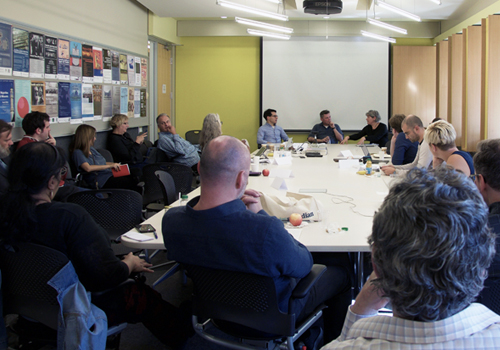Apologies are never perfect or final, but they remain crucial and valued — perhaps now more than ever.
Apologies seem to be everywhere. From Hollywood producer Harvey Weinstein’s muddled response to accusations of sexual harassment and assault to Uber’s public apology after their licence to operate was revoked in London, UK, apologies come in all shapes and sizes: personal, corporate, or political. They also vary widely in their levels of sincerity and success.
Apologies were the subject of an interdisciplinary conference at U of T’s Centre for Ethics on October 20 and 21. The Ethics of Apology welcomed scholars from law, philosophy, political science, cultural studies and related disciplines to ask questions like: what kinds of public apologies have we seen here in Canada, and how do they compare to international examples? What are the factors of a “successful” apology and what are the outcomes of official apologies, both positive and negative?
International panel of participants
International participants included renowned apology expert Nick Smith, author of Justice Through Apologies: Remorse, Reform and Punishment and I Was Wrong: The Meanings of Apologies and professor of philosophy at the University of New Hampshire. A number of U of T scholars spoke at the conference as well, such as Professor Mark Kingwell of the Department of Philosophy, criminology & socio-legal studies PhD student Mayana Slobodian, and Simon Stern, an associate professor in the Faculty of Law.

One panel at the conference focused on apologies to LGBTQ Canadians, including calls for the Toronto police to apologize for the 2016 raid of Marie Curtis park, and the federal government’s expunging of the arrest records of gay men persecuted in the late 19th and early 20thcentury. Another panel looked at the history of government apologies for the colonization of Indigenous peoples and the internment of Japanese-Canadians in WWII.
In many high-profile cases, accused wrongdoers are often hesitant to offer apologies for fear that the apology may be used as an admission of guilt in legal proceedings. However, lawyer Doug Elliott quickly challenged that notion. Elliott, a graduate of U of T’s Faculty of Law, is known for his class-action work for gay and lesbian couples.
Elliott pointed out that in Canada “there is no single case where an apology has been used as the basis of a lawsuit, or used as evidence to prove liability.” In fact, he warned, a lack of apology can sometimes lead to legal action, too. So then, why not apologize?
Apologies are hopeful to those of us that feel hopeless.
Apologies, he noted, “are hopeful to those of us that feel hopeless.”
Slobodian, a PhD student at U of T’s Centre for Criminology & Sociolegal Studies spoke about the ways in which the federal government has been given full credit for the work of the Truth and Reconciliation Commission, when in fact an official government apology for harm to Indigenous populations did not come without significant obstacles, setbacks, and missteps. Like Elliott, she discredited “the folkloric idea of apology as liability,” the fear that an apology will cost the apologizer something.
Finally, Kingwell explored the style and rhetoric of contemporary celebrity apologies. A trend in celebrity apologies, said Kingwell, is that there is often “no sense of pre-existing remorse.” Celebrity apologizers, rather, seem to be forced by public pressure and their public relations teams to execute the performance of an apology.
When you’re forced to apologize, it’s not an apology.
“When you’re forced to apologize, it’s not an apology,” said Kingwell.
But Kingwell’s co-panelist Stern pointed out that in cases where wrongdoers are forced to apologize by courts of law, the forced apology has still been shown to contribute to victims’ healing. It makes victims feel that their complaints were valid and recognized by an institution, and they’re being restored to a place of acknowledgment and respect in their communities.
While the conference offered many perspectives, one theme seemed to stand out: apologies are not necessarily the end of an issue, or the solution to a problem. They are simply one in a series of steps that aim to restore justice, recognize history, and respect the needs and wishes of those who have been wronged.
“Why assume that one can time an apology so that it’ll be the last word?” asked panelist Matt James, associate professor of political science at the University of Victoria. Since we can never know all the information about a situation, and our perceptions of historical events change over time, we should “fight and warn against the expectation that apologies will provide closure,” says James.
Apologies are never perfect or final, but they remain crucial and valued — perhaps now more than ever.

